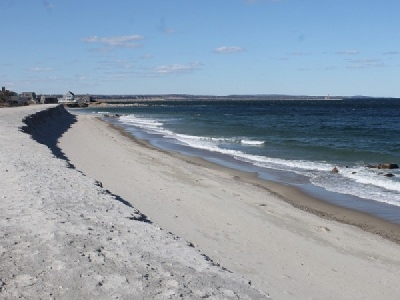
Posted on May 8, 2018
By Paul Gately, Wicked Local
Sandwich selectmen, seeking public support, conducted a 90-minute workshop discussion May 3 into efforts to complete Town Neck Beach and dune restoration projects.
Both projects have long been in the design phase and longer still in the permitting process, which is still ongoing at the state level.
Selectmen urged their cable television audience to essentially avoid money-pit sentiment and to be patient and optimistic about various factors built into shoreline restoration, which are lengthy.
There are factors in play, notably ecological issues, sea-level rise, climate change, severe winter nor’easters, the need for state environmental permits, completion of a study by the Army Corps of Engineers into the canal jetty impacts on drifting sand, canal-channel dredging, tapping the Scusset Beach sand basin, applying political pressure on the permits front, and generally hoping that “sacrificial sand” will not continue to be washed out into the bay.
That’s for starters. Then there is the continuing effort by selectmen to win community understanding about Town Neck Beach/dune efforts.
The workshop was undertaken to be comprehensive as well as informative, and was filled with background and history of shoreline efforts that have proved frustrating for years but have survived as one of various boards of selectmen’s top priorities. There is still, however, discontent arising in the community.
Selectman David Sampson said he talks with people and finds a lack of that basic understanding and appreciation for the “town’s good efforts.”
“Money, of course, is the big challenge,” he said. “And some people don’t realize all of the things that are happening.”
Then there is the added challenge of starting to consider projects landward of the marsh that would, perhaps more directly, serve to protect historical assets, valuable private property, and key downtown infrastructure. Coastal resiliency is the new phrase that seems to be gaining favor when it comes to protecting what is valuable in towns well beyond the shoreline.
Selectmen Chairman Susan James acknowledged that the overall total beach renourishment effort is frustrating and “people are getting very anxious about the whole process.”
Indeed. There is continued community murmuring that protecting the beach as delineated and undertaken to date is costly, is not the way to go ,and that municipal funds should be directed to efforts west of the marsh that might protect downtown in new ways.
Selectman Robert George sounded that theme. He asked Woods Hole Group shoreline consultant Kirk Bosma if the town has enough time left to secure permits, sand and money to restore the beach, bolster the dune and protect the marsh as well as downtown Sandwich.
“We’ve got a ticking time bomb, sitting down there” George said. “I’m not an engineer, but I don’t think we’ve got much time left to get the whole (Town Neck) job done before we lose the center of town.”
George’s sentiment echoes the mission of The Trustees of Sandwich Beaches, that is, in part, to protect the town’s historic district and low-lying areas as climate change continues and sea levels rise.
Bosma was understanding, saying this past winter’s three back-to-back nor’easters took their toll.
“The beach is in bad shape,” he said. “Storms will continue to push water through the inlet. The town is working as quickly as possible to get this (project) done. We have the sand. We have the (pending) permits. So we’re dealing with the money.”
James, in turn, said the state environmental review process has to be “facilitated.”
“Private homes can get permits to protect their property, and I understand that. But everything bogs down with a municipality. It’s frustrating,” she said.
Bosma said the Massachusetts Department of Environmental Protection is understaffed now when it comes to reviewing permit requests for projects and otherwise processing them. He said part of the overall goal is to win approval for the town to tap Scusset sand north of the canal via hydraulic dredging and then rely on periodic canal-channel dredging to provide “a feeder mechanism” for Town Neck Beach.
“What can you do?” he said. “Political pressure can be applied. Political pressure is the way to go. But you have to understand that you have to get a whole raft of permits for a project this size.”
Sandwich resident Paul Shrader said he has observed changing natural conditions at the marsh and beach since 1996. A former member of the Massachusetts State Erosion Committee, he provided some sobering insight.
“This is a very significant problem for our community,” he told selectmen. “We all want something done immediately. Massachusetts has 1,500 miles of coastline, not that many of which are in Sandwich. In a state ranking of (serious) erosion issues, Sandwich was not even within the top 20 communities.”
With a degree of varying perspective, Shrader said it is commonly accepted around town that the Army Corps of Engineers jetty system at the canal’s east end blocks the littoral drift of sand past both Scusset and the waterway entrance to Town Neck.
Source: Wicked Local Sandwich





